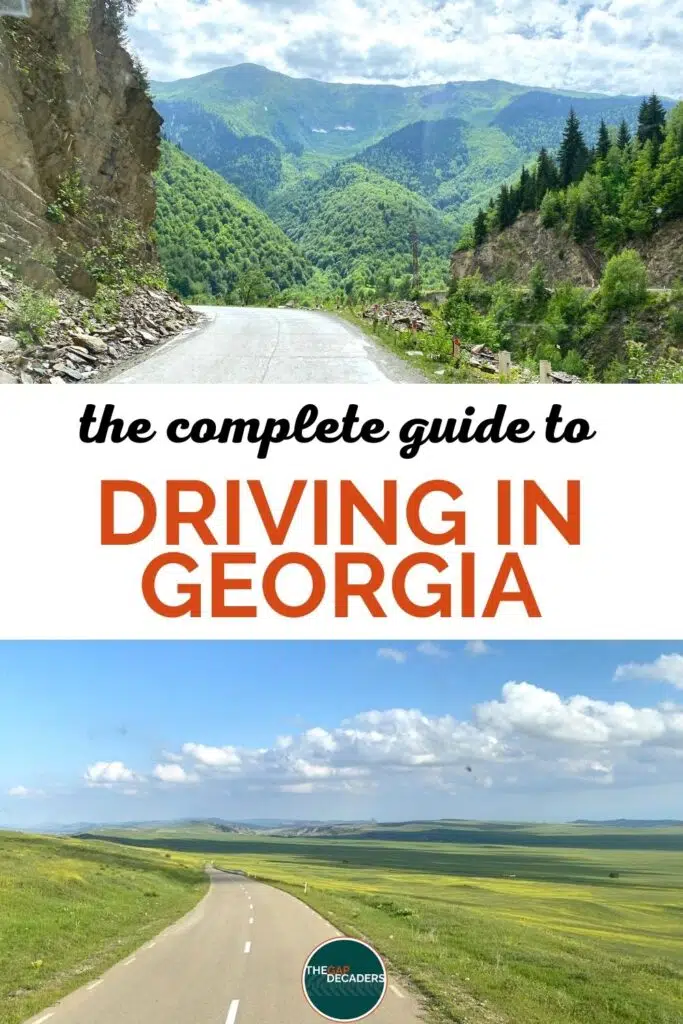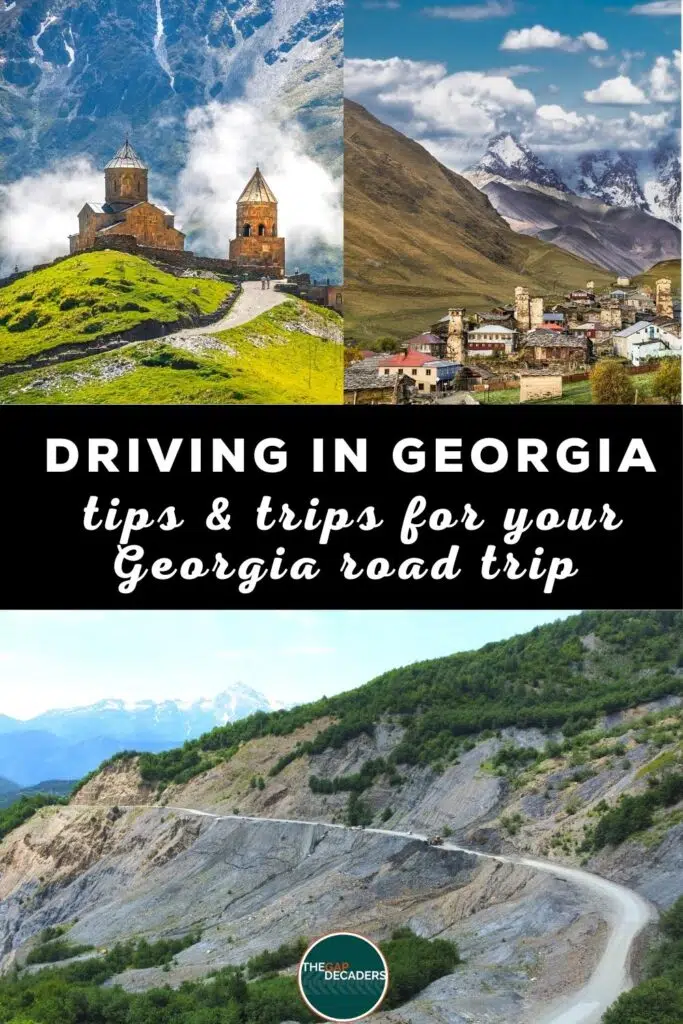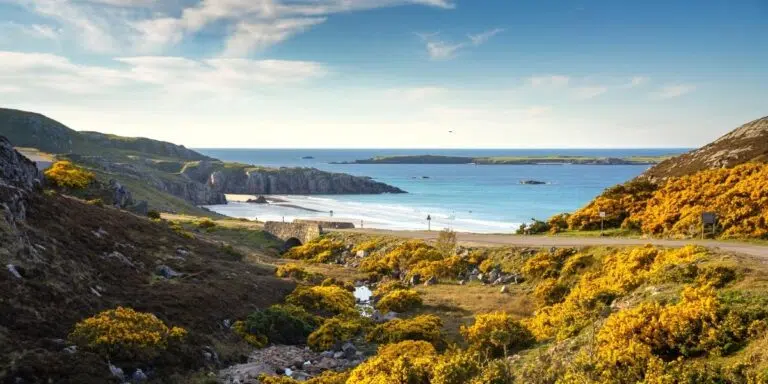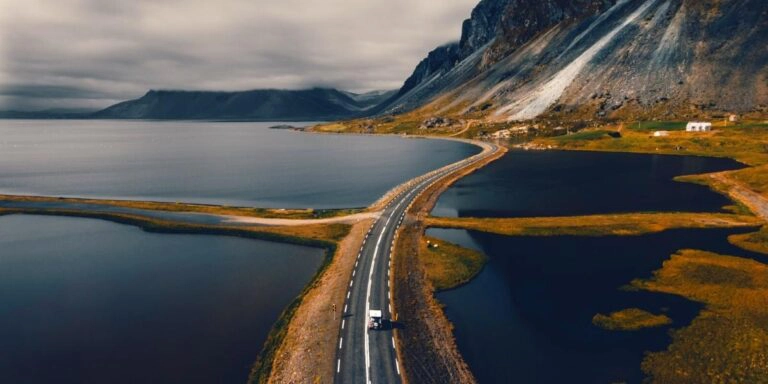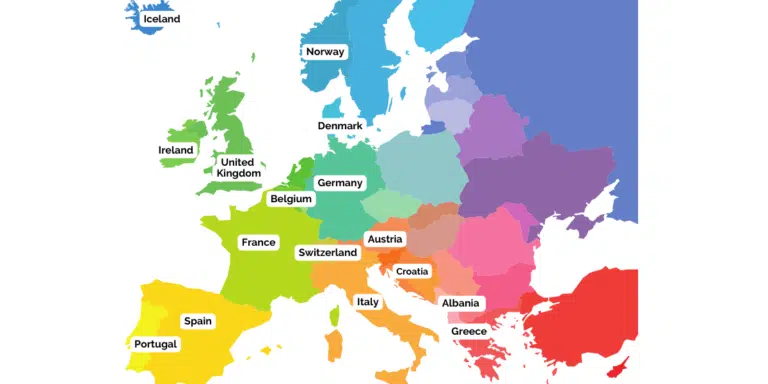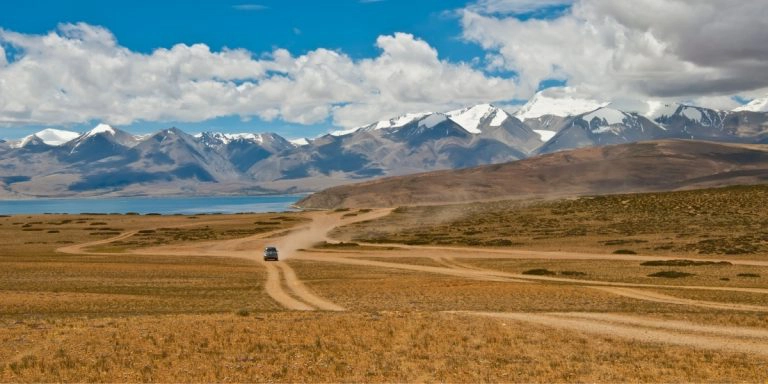This post may contain affiliate links, from which we earn an income. Click here to read our affiliate policy.
Georgia Driving & Road Trip Travel Tips
The landscapes of Georgia are made for driving, with all four corners of this country, where east meets west, offering diverse road trip experiences surrounded by the glorious backdrop of mountains, coasts and rolling steppe.
But driving in Georgia is not like driving back home, and at times being on the road in Georgia can be challenging. Road works, weather, animals and reckless drivers create hazards aplenty, meaning you need to be clued up and switched on behind the wheel.
We spent three months road tripping in Georgia in 2022 and learned the hard way, so you don’t have to! In this Georgia travel and driving guide we’ll share lots of practical driving tips and tricks, information about road conditions, and highlight what to expect when you’re behind the wheel so you can enjoy a safe and stress-free road trip in Georgia.
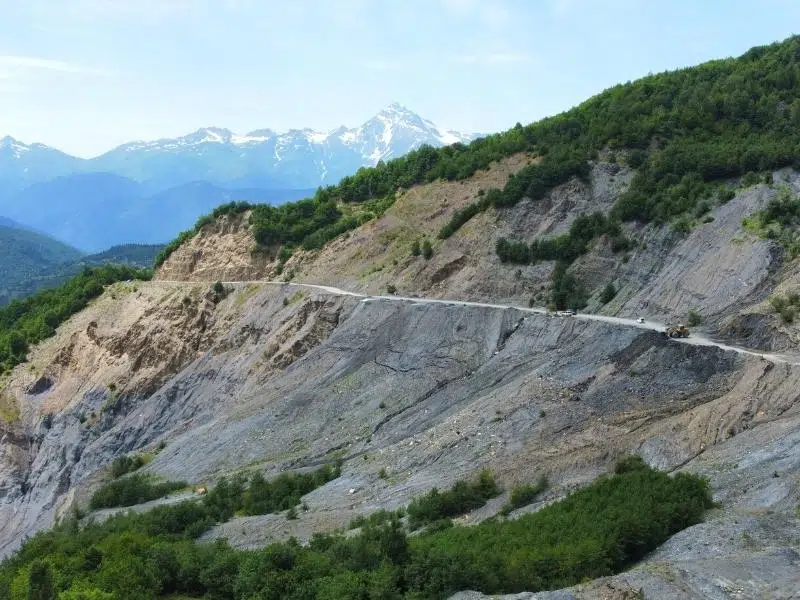
Is it Safe to Drive in Georgia?
Lots of readers tell us they are terrified of driving in Georgia. Whilst there are more road traffic accidents in Georgia than the USA and UK, it is safe to drive in Georgia as long as you pay attention, drive carefully and expect the unexpected, especially in cities and off the beaten track rural roads.
Is this your first time visiting Georgia? Get all the information you need in our Georgia Travel Guide, including what to pack, the best time of year to go, getting there and practical tips to help you have the best trip!
Why Drive Yourself in Georgia?
Georgia is a tiny country, with a well developed public transport system which includes marshrutka vans, shared taxis and trains, as well as a plethora of day trip options from Tbilisi. You may wonder why you would want to self-drive when all this exists.
If you want to get under the skin of the country and experience the true Georgia, you need to get off the beaten path a little. Sure, go and see all the big-hitting tourist attractions, but even if you go it alone for just a few days, you’ll experience so much more of authentic Georgia.
Managing your own itinerary and not being beholden to a driver or other passengers gives you the freedom to explore at your own pace. Enjoying a lie-in, getting up and going at the crack of dawn, or just moseying around looking at interesting stuff as you find it makes driving in Georgia a smart choice.
You may also feel safer driving yourself and setting your own pace. Some of the taxi and marshrutka drivers are on tight schedules and in our opinion, drive way too fast and take unnecessary risks for the road conditions.
RELATED POST: Is Georgia a Safe Country? A Comprehensive Guide for Adventurous Travelers
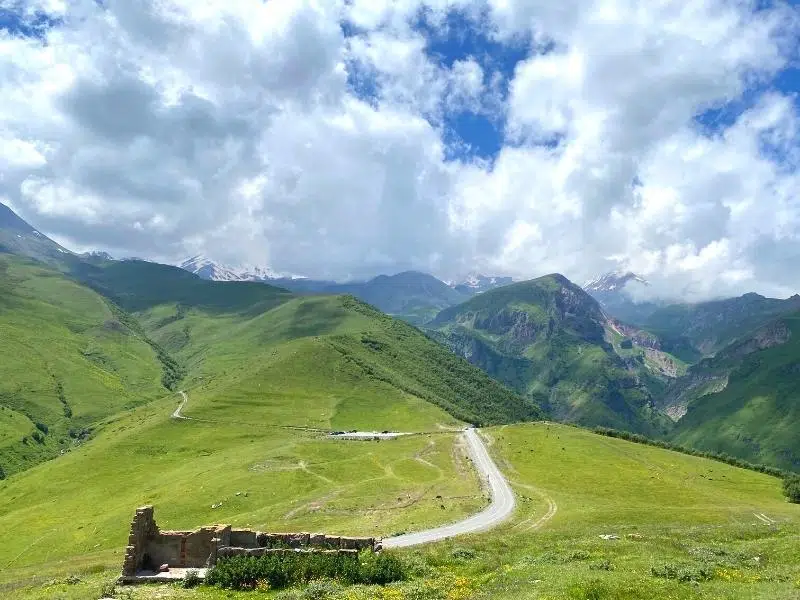
Renting a Car in Georgia
Even if you hire a car for your Georgia road trip from a reputable and highly recommended national or international chain, there may be language barriers and opaque practices when you get to the car rental depot. These are some common issues;
- Not all marks and scratches (inside and out) have been noted.
- You are not given the opportunity to inspect the vehicle or asked to do this in the dark.
- Fuel marked as full on paperwork but gauge showing empty.
- The car is not what you ordered; manual not automatic, no air conditioning, not 4×4, a smaller model, or some other discrepancy.
Sometimes you have to accept the local ways – only you can decide what you’re comfortable with and how much you’re willing to concede at this point in your trip. Take dated photos and/or video of any damage to the car which has not been noted and share with the car hire company as soon as possible.
We would strongly advise you to cover the excess you’ll have to pay if there is an accident. This car hire excess insurance can usually be added at the time of booking, when you collect the car, or by using a third party to independently insure the excess, such as Insurance4CarHire, which is usually a much cheaper option.
You may not be able to drive outside of Georgia in a hire car unless planned in advance, so check with your hire car company first. If you do drive into Armenia or Azerbaijan, you’ll need a valid car passport and a border crossing permit, which will cost extra.
You won’t be allowed to drive a rental car from Georgia into Turkey or Russia, or Georgia’s occupied territories of Abkhazia or South Ossetia – although you can explore the Georgian Military Highway and get right up to the Russian border!
We recommend hiring your car with Localrent.com, an aggregator of local car rental companies. They work with small car rental companies that only operate in their location and closely monitor the quality of their service. This means you get the best service for the lowest price.
Whenever we travel to a country without our own transport that is covered by Localrent.com we book with them because they are always best on price and offer a solid and reliable service.
Renting a Campervan in Georgia
If you fancy a self-drive campervan trip, Overlando offer fully equipped 4×4 campers, including the awesome (and very cute) UAZ Bukhanka, a Soviet classic named after a loaf of bread! If you prefer a smaller vehicle, check out their Lada and Hilux cars with rooftop tents.
This option works because you can park and sleep anywhere in Georgia, as long as you’re not on private land. Use the Park4Night app to find overnight spots, and sleep on a high mountain pass, next to a beautiful river like we did in Mestia, or hot spring, or in a wildflower meadow.
If you’re up for an adventure, this is definitely the best way to see the country. The guys at Overlando offer fantastic service and are more than happy to help you plan your trip. Book well in advance though, these little cuties are popular!
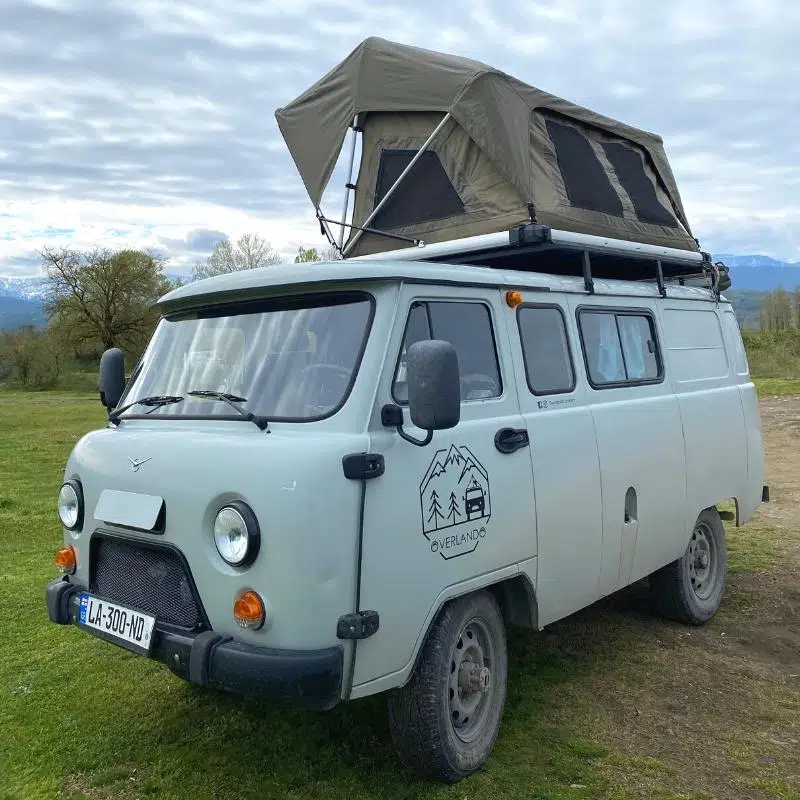
Taking Your Own Vehicle to Georgia
Driving to Georgia from the UK or Europe is pretty straightforward, and it means you can easily explore the amazing countries of Turkey, Armenia and Azerbaijan on your trip.
- You’ll require your driving license. You also need an International Driving Permit (IDP) for Georgia, although we were not asked to produce this.
- You need your original motor vehicle registration document, and the vehicle must be registered in the name on your passport, which should match your driving licence. You must take the original document as you are required to temporarily import your vehicle into the country.
- You are required to have a minimum of third party insurance, and will require a green card as proof of this. It is possible to buy car insurance online from the government-run Compulsory Insurance Centre before entering Georgia, if your usual insurance company will not insure you.
- There is no cost to taking a vehicle into Georgia, but be aware that cars and campervans can only stay in the country for 90 days, and for motorhomes and overland vehicles with a gross vehicle weight exceeding 3,500kgs, it’s 60 days. If you overstay, the fine is 50GEL per day. A simple solution is to pop into Armenia or Turkey for a day, and rest the 60/90 day limit.
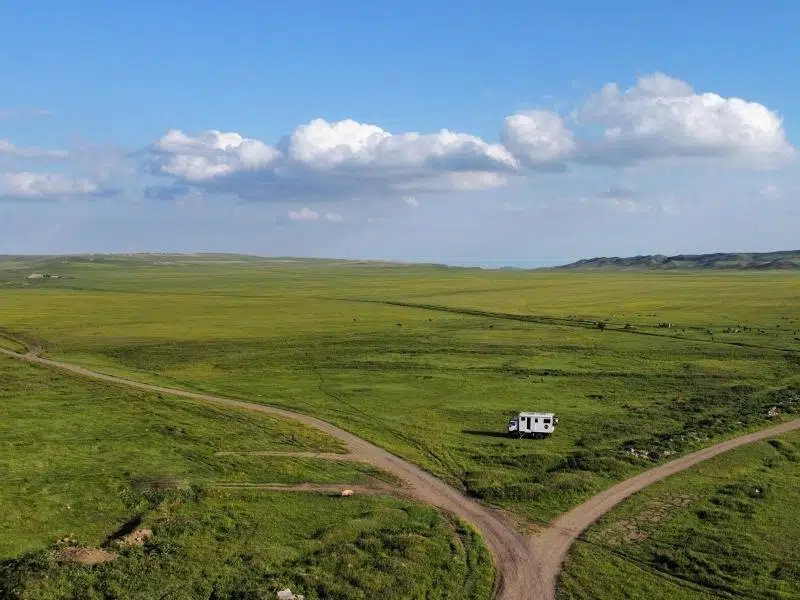
Georgia Driving Laws
- Drive on the right side of the road.
- Vehicles from the right and emergency vehicles have priority.
- Give way to traffic entering a roundabout on the right when you are already on the roundabout.
- Traffic lights flash amber before they turn red, and there is no right turn on red.
- The law requires you and your front seat passengers must wear seat belts.
- Children under the age of 12 must sit in the back of the car. Children under 7 must use a suitable child restraint.
- Drivers are not allowed to hold a phone whilst driving. You may use a phone only with a hands-free setup.
- There is zero tolerance to drink driving in Georgia. That means there must be no alcohol in your system when you drive.
- The speed limits are 100-110km/h on motorways, 80km/h on national roads and 60km/h in built-up areas. Keep your eyes peeled for signs as it’s not always clear whether you’re in a built-up area or not.
We have seen every single one of these rules of the road flouted when driving in Georgia, but that doesn’t mean as a foreigner you should not follow them.
Thinking about driving further afield? Find out all you need to know about driving in Turkey in our complete guide.
Georgia Road Etiquette
Georgia drivers vacillate between driving painfully slowly and overtaking you at speed on a blind bend. They will often not stop at pedestrian crossings or intersections, honk repeatedly even though it’s clear you can’t move, drive down the middle of the road, and park in the most inappropriate and thoughtless places.
In other words, they’re pretty rude and quite aggressive, which is at odds with the usual character of Georgian citizens. Expect the unexpected, pay attention and understand that drivers in Georgia don’t know how to use their mirrors or indicators, and you’ll be fine!
Planning a road trip to Georgia? Get six Georgia road trip ideas with routes and itineraries + ideas about what to see and do en route.
Road Signs in Georgia
On the vast majority of roads you will see traffic and directional signs displaying both the Latin alphabet and Georgian scripts. In some rural areas, you may only see the Georgian scripts, which even Google has a hard time translating.
Try using on online tool like Translitteration or Lexilogos, which have virtual Georgian keyboards.
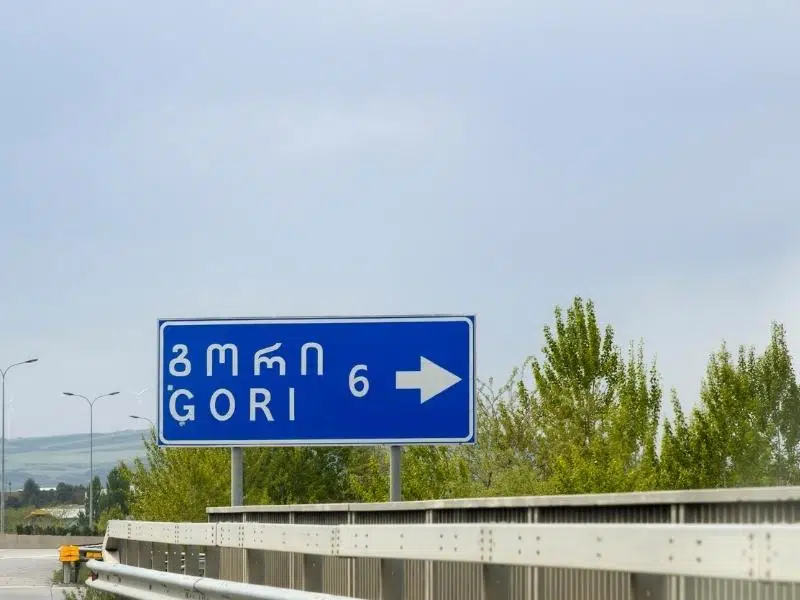
Road Quality in Georgia
Expect potholes – lots of potholes, dangerous verges, raised and sunken manhole covers, disintegrating roads, and multiple surface types from tarmac to reinforced roads and unsealed tracks, along with spectacular views, Top Gear style driving and enough adventure to satisfy even the biggest of thrill seekers!
Sometimes the tarmac just disappears, leaving large potholes and craters full of rubble, or gaping holes at the sides of roads, which is particularly disconcerting when there is a sheer drop into a river or ravine below! Damage is often passable with a little caution but if you’re unsure get out and have a good look around, checking the road surface carefully.
Unsealed tracks do not necessarily need a four-wheel drive vehicle. You can road trip the whole of Georgia in a two-wheel drive vehicle, as long as you deploy common sense. Good ground clearance, robust tyres, good suspension and confident driving are requirements, along with the proviso that you’ll only be able to road trip in the summer months, and when it’s dry.
There are a couple of exceptions to this – the roads to Georgia’s remote mountain villages of Tusheti, Khevsureti and within the Vashlovani Protected Areas all require 4WD to navigate safely. You’ll need to have experience of driving a 4×4 and be a confident driver to tackle these spectacular roads.
There are no toll roads in Georgia.
Do you love adventure? Check out these top adventurous road trips to some of the most exciting places in the world!
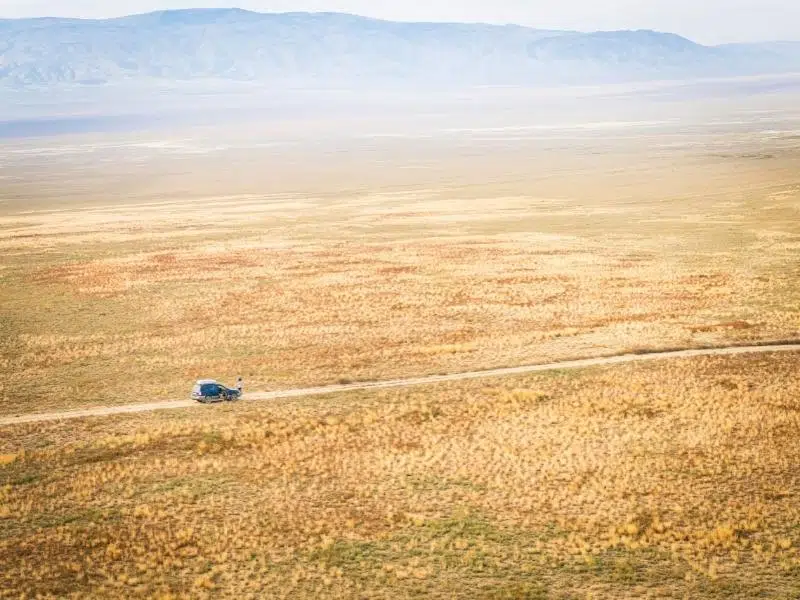
Georgian Weather
Georgia is a country of weather extremes and this is a dominating factor where the roads are concerned. Huge temperature differentials between winter and summer, heavy snow and raging snowmelt rivers in spring play havoc with the road system.
Vast swathes of road simply disappear, either over the side of a mountain or engulfed by a landslide, and have to be rebuilt every spring, meaning many roads into the high Caucasus are closed between late October and June.
There is often little warning that damage may have occurred, particularly if it’s recent, and landslides can happen in an instant when there have been heavy rains. Be aware, consider changing plans, and don’t allow yourself to be distracted by the stunning scenery whilst driving into a large pothole!
Check with the Roads Department of Georgia before setting off to find out about road closures and restrictions.
RELATED POST: SIM Cards in Georgia: How to Buy + Best Deals
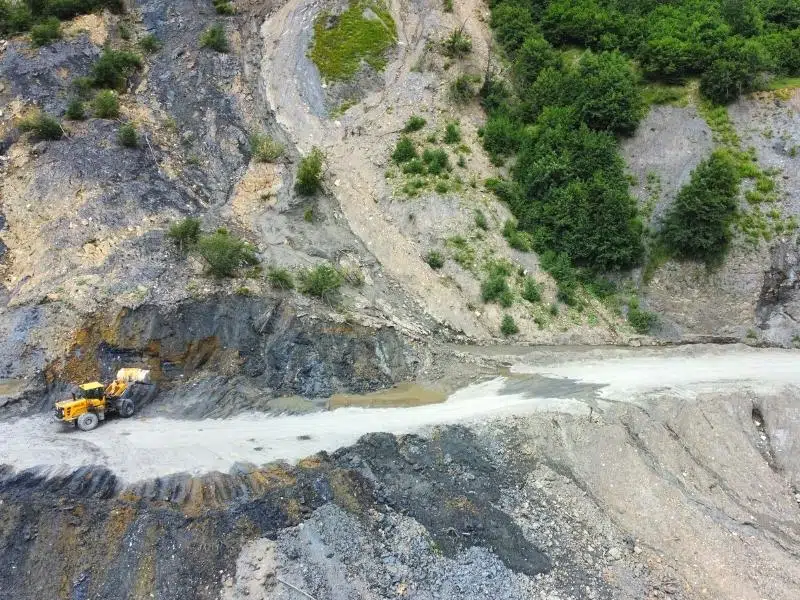
Road Works in Georgia
Georgia is heavily investing in their freight transit infrastructure which means that many of the major cross-country roads are being upgraded on an enormous scale, with huge tunnels and bridges under construction along the E60 between Tbilisi and the coast, and the E117 north to Russia.
Roadworks are not always well managed, and often there is no system for two-way traffic to pass, and no traffic management to control the flow. Often traffic is diverted onto a gravel track with little warning, and this can mean a lot of manoeuvring to get through, and having to contend with other traffic trying to do the same.
If you wait for people to let you in or make space, you’ll be there for a very long time. Being bullish may not come naturally but it’s a must when driving in Georgia.
Make sure you have travel insurance you can trust when driving in Georgia. We recommend True Traveller for their 5 star TrustPilot reviews, variety of cover options, great prices and excellent service.
Road Hazards in Georgia
You will undoubtedly come across lots of hazards when driving in Georgia and awareness cannot compensate for the unexpected, so drive cautiously in unfamiliar surroundings.
It’s common for pedestrians, cattle, street dogs, and herds of goats and sheep to wander into the road, often without looking. In rural areas, at the beginning and end of summer, livestock is moved on a large scale and although the herds are accompanied by shepherds on horseback and on foot, they can be a bit unruly!
You’ll see an eclectic mix of vehicles, from brand new Mercedes AMG and G Wagons to ancient Ladas, rickety old tractors and Russian trucks bellowing clouds of black smoke. This creates a discrepancy in speed and driving styles, with the older and bashed up cars usually travelling much faster than the shiny new models. Don’t make assumptions about driving behaviour based on the vehicle type!
Probably the biggest hazard is other drivers, who often drive way too fast without care for other road users, fail to indicate, overtake in dangerous places and cut in perilously close to your front bumper, before slamming on the brakes to avoid the car in front.
Hazard warning lights are often used as an unofficial way of letting other road users know there is an obstruction, such as cattle, on the road. You’ll use them a lot when you drive in Georgia!
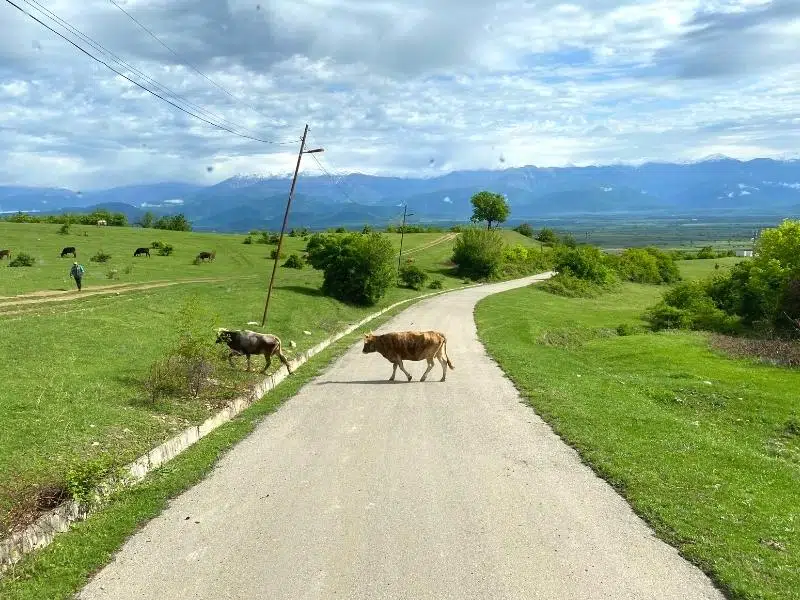
Driving at Night in Georgia
Driving in Georgia at night is particularly hazardous. Leave enough time to get to your destination, always it will take longer than you think.
At night, your lights may be the only ones on the road but there will be wild animals, other cars and people that you just can’t see. On mountain roads, you could encounter rock falls which create debris across the roads that you may not see until the last minute.
If you cannot avoid driving after dusk, be very cautious and ready to brake at all times.
Best Navigation Apps for Georgia
There are a number of options to help you navigate in Georgia. Maps.me was our go-to sat nav app. Download the app and free Georgia map before your trip for offline access and navigation where there is no signal.
Whether you use Maps.me, Google Maps or any other sat nav or app, the journey time frame is likely to be inaccurate. As a rule of thumb add another third onto the predicted arrival time, and you’ll be about right.
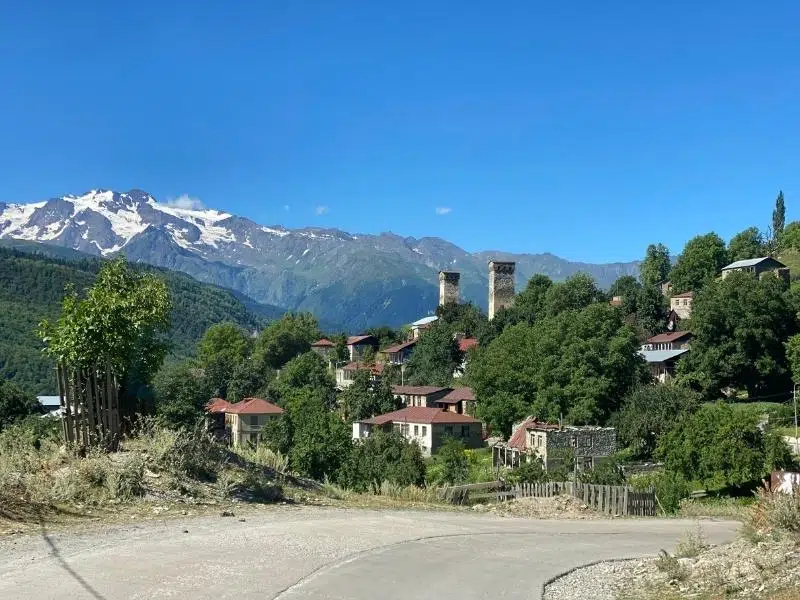
Driving in Georgia’s Cities
For some inexplicable reason, the standard of driving in Georgia’s cities deteriorates, and is even worse than in rural areas! If possible, consider avoiding driving in Tbilisi (where it can also be hard to park) – spend time in the city at the start or end of your visit, and collect your hire car from the airport, or find a hotel which is out of the centre.
Most cities have a multitude of roundabouts on the main roads in and out. Often two lanes can become four or five lanes of traffic as vehicles jostle with each other for supremacy, and there is no clear give way precedence.
There are often no lane markings on the roundabout itself so be cautious as you enter and exit, checking in both side mirrors for vehicles and mopeds who will cut across you without a thought.
Parking in Georgia
Parking is relatively easy as many of the roads in towns and cities are wide, allowing for plenty of parking on both sides.
You may be asked to pay for secure parking in Tbilisi, Batumi and Kutaisi, but elsewhere it’s a free-for-all, with people often parking in the most inconvenient places.
Fuel in Georgia
Fuel stations are plentiful, even in the most remote areas. It is considerably cheaper to fill up in Georgia than anywhere in Europe, with diesel, unleaded petrol and LPG around 30-40% cheaper. You can check up-to-date fuel prices here
Petrol stations are usually manned and someone will help you to fill up, or fill up for you. If language is a barrier, just point to the fuel you want. You pay the attendant directly with cash, or there may be a cordless card machine.
Most of the popular brands like Wissol, Lukoil and Socar will accept credit cards. Smaller gas stations will only accept cash.
A lot of Georgian diesel comes from Russia, and is known to be dirty and is not good for modern engines. If you’re in a Euro 6 vehicle, you must use what is called ‘Euro diesel’ – inevitably this is more expensive than regular diesel.
Unleaded fuel generally comes in three grades – Super (98), Premium (95), and the less common Euro regular (92).
Electric vehicles are not common in Georgia and there are only a limited number of EV chargers around the country, mainly along the major highways. You can find a map here.
Breaking Down in Georgia
If you are taking your own vehicle to Georgia, check whether any breakdown cover you have can be extended to cover the country. If the cover can be extended, it is highly likely to be on a reimbursement basis, where you manage the process and claim the money back.
Check with your breakdown provider before leaving and ensure you know who to call in the event of a breakdown.
Georgia has no national breakdown service, and you will have to use a local recovery service and garage to resolve your vehicle problems. If you do break down, passing locals will generally stop to make sure you’re ok and give you a hand.
Most towns will have a mechanic or car workshop where basic repairs can be managed and support from further afield can be drafted in if necessary. Georgians are pretty resourceful and everyone seems to know someone who can help.
If you are hiring a vehicle, ask on collection what the process is if you break down, or whether you need to pay extra for breakdown cover.
The emergency number in Georgia is 112.
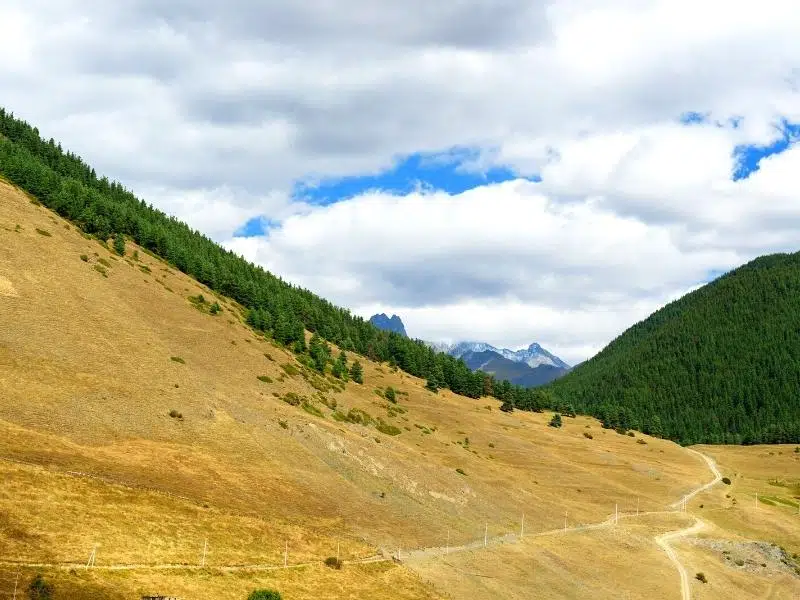
Plan Your Georgia Road Trip Route
Georgia is a small country, but due to road conditions and the mountainous landscape, it can take a lot longer to get to places than you think. If you don’t plan and arrive late, you’ll find yourself driving in the dark, when hazards multiply.
Map out and plan your road trip route in advance and book your accommodation, particularly where the choices are limited. Leave plenty of time for breaks and stops to take pictures en-route, as well as for any unexpected road damage or roadworks.
Plan to arrive in the light where at all possible – it will be easier to find your accommodation and you’ll arrive stress-free.
If you’re planning your own road trip in Georgia, get practical tips and find out how to work out your route, budget for your trip and book a hire car in our complete guide to planning a road trip.
Be Prepared When Driving in Georgia
If we haven’t scared the bejesus out of you and you’re still heading to Georgia for a road trip, make sure you’re prepared with all the important stuff before you hit the road.
Alongside your documents, at the top of your car packing list should be loo paper (most restaurant and public loos don’t provide this), lots of water and huge amounts of snacks. We love eating so much, we even wrote about the best road trip snacks!
There is no legal requirement to carry any safety gear in your car in Georgia, but we strongly recommend having high-visibility vests, a warning triangle, fire extinguisher and a first aid kit.
Our road trip checklists can help you get organised with packing and pre-trip planning. Easy to download and print, our checklists make sure you stay on top of your planning.
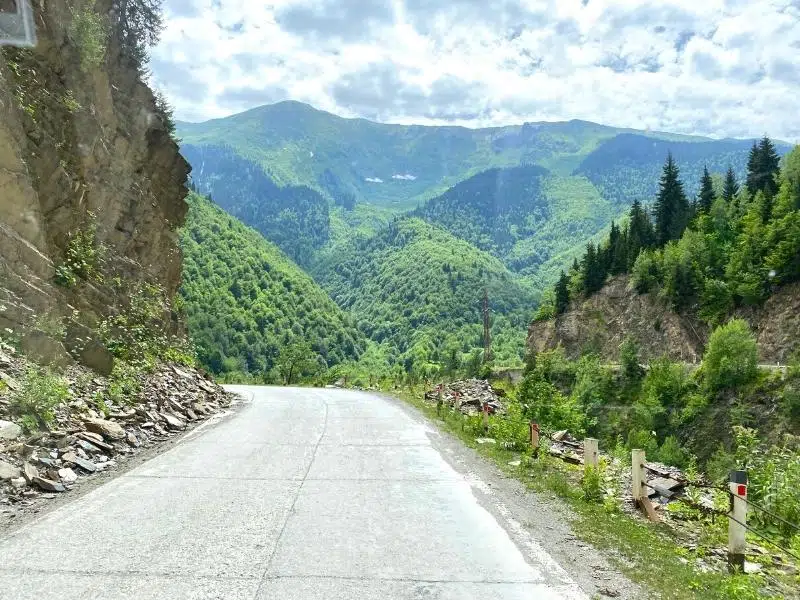
Should I Take a Road Trip in Georgia?
Despite the challenges of driving in Georgia, we loved the country for its dramatic landscapes, friendly people, amazing food and yes, the roads!
Much of the above is worst case scenario stuff and chances are you won’t encounter a landslide, kamikaze cows or unpassable tracks. We felt perfectly safe in Georgia for the three months we spent there and enjoyed testing ourselves in a new driving environment.
Getting stuck in and doing it for ourselves was so much more rewarding than taking a guided tour or bus trip. Instead of looking on through a coach window, we were immersed in the noise, smells and culture of this amazing country. We were able to stop where and when we wanted to explore, change our plans at the last minute and revel in the freedom of travelling at our own pace.
Are you looking for road trip inspiration? Check out these top posts…
North Coast 500 Route Planner + Itinerary, Map & Tips
Iceland Road Trip: 27 Epic Things to See & Do
Best Road Trips in Europe: 28 Epic Routes You Can Actually Drive
Norway Road Trip: Four Unmissable Routes
Germany Road Trip: 8 Unmissable Routes
Morocco Road Trip: An Epic Atlantic to Sahara Journey
Love it? Pin it!
